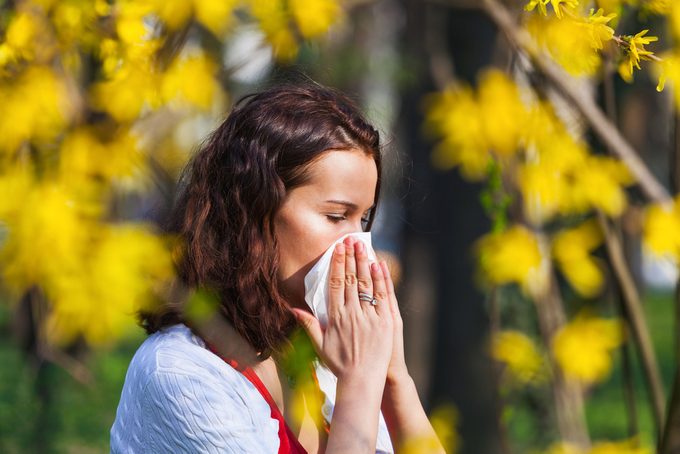What Causes Spring Allergies?
Why do you constantly sniffle when the weather gets warm? Here’s what’s happening in your body when spring allergies hit, and what you can do to curb your symptoms.

Ah, spring. It’s that wonderful time of year when the temperature starts to rise and everything is in bloom. But for many Canadians, it also marks the beginning of spring allergy season, a time of runny noses, itchy eyes and constant sneezing. Depending on what you’re allergic to, allergy symptoms may last right through summer. This is because trees, grass, molds and ragweed are the most common triggers.
According to the Allergy Asthma Information Association, approximately 25 percent of Canadians suffer from allergic rhinitis – better known as “hay fever.” And that number has grown significantly, says Dr. Susan Waserman, clinical immunologist at McMaster University in Hamilton, Ont. “As an allergist, the face of my clinic has changed. All allergy has doubled or tripled.”
Anatomy of an allergic reaction
People inherit a certain genetic disposition towards allergies, explains Waserman. So if you’ve got allergies, you’ve most likely got your parents to thank for it.
During allergy season, your body has an immune reaction when exposed to different allergens and forms allergy-specific antibodies (called immunoglobulins). These antibodies sit on cells in your eyes, nose, lungs and skin. And the next time you come into contact with a particular allergen, your body reacts by releasing chemicals called histamines, leading to an allergic reaction.
Determining your allergy triggers
Before you can treat allergies or try to avoid the cause of your flare-ups, you need to identify what’s causing your symptoms.
If you know that you’re at an increased risk for allergies due to family history, it’s a good idea to get an allergy skin test (called a scratch test) before the season begins. A scratch test exposes the skin to small amounts of irritants and is an effective way of determining what you’re allergic to. However, going through the test when you’re already suffering from allergy symptoms can increase your discomfort.
“Start prepping the season before,” suggests Janine Fraser, a naturopath with a special interest in allergies, at West Shore Family Naturopathic in Langford, B.C. “By the time people are reacting and not feeling well, they’re going to need something pharmaceutical.”
Keep in mind that your allergies may be linked to more than what’s swirling around outside. “During allergy season, you could become more sensitive to food allergies,” says Waserman. Determining whether foods are an issue is an important part of managing your allergies, Fraser adds. “Our health is built by the food we’re eating,” she says. “An anti-inflammatory diet won’t completely eliminate an allergy, but it will take some burden off.” She does note that you should consult a professional before you avoid any specific foods. “If you eliminate the wrong food, you can put yourself at risk for other things [such as nutrient deficiencies],” she cautions.




